See also
- The Civil War on Drugs, a comedy sketch series from the TV show The Whitest Kids U' Know
- Drug wars (disambiguation)
The war on drugs is a United States government campaign against illegal drug trade.
War on Drugs may also refer to:
The Gulf War (1990–1991) was an armed conflict between Iraq and a multinational military coalition led by the United States, triggered by the Iraqi invasion of Kuwait in August 1990.
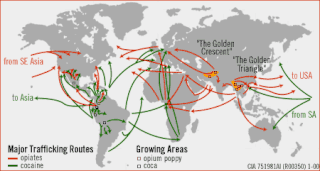
The illegal drug trade, drug trafficking, or narcotrafficking is a global black market dedicated to the cultivation, manufacture, distribution and sale of prohibited drugs. Most jurisdictions prohibit trade, except under license, of many types of drugs through the use of drug prohibition laws. The think tank Global Financial Integrity's Transnational Crime and the Developing World report estimates the size of the global illicit drug market between US$426 and US$652 billion in 2014 alone. With a world GDP of US$78 trillion in the same year, the illegal drug trade may be estimated as nearly 1% of total global trade. Consumption of illegal drugs is widespread globally, and it remains very difficult for local authorities to reduce the rates of drug consumption.
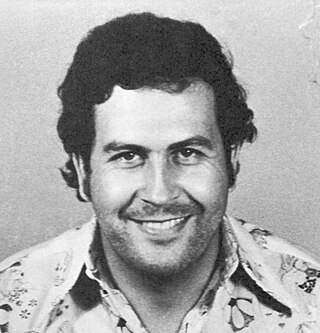
The Medellín Cartel was a powerful and highly organized Colombian drug cartel and terrorist organization originating in the city of Medellín, Colombia, that was founded and led by Pablo Escobar. It is often considered to be the first major "drug cartel" and was referred to as such; due to the organization's upper echelons and overall power-structure being built on a partnership between multiple Colombian traffickers operating alongside Escobar. Included were Jorge Luis Ochoa Vásquez, Fabio Ochoa Vásquez, Juan David Ochoa Vásquez, José Gonzalo Rodríguez Gacha and Carlos Lehder. Escobar's main partner in the organization however was his cousin Gustavo Gaviria who handled much of the cartel's shipping arrangements and the more general and detailed logistical aspects of the cocaine trafficking routes and international smuggling networks which were supplying at least 80% of the world's cocaine during its peak. Gustavo, also known as León seems to have also had a strong hand in the cartel's unprecedented acts of narcoterrorism, right alongside his cousin Pablo and was considered to be second in command of the cartel and therefore one of Colombia's most wanted men, with both him and Escobar having arrest warrants pending from other nations where their criminal activity had spread to, such as in Spain and the U.S. Meanwhile, Pablo Escobar's brother Roberto Escobar acted as the organization's accountant. The cartel operated from 1976 to 1993 in Colombia (Antioquia), Bolivia, Panama, Central America, Peru, the Bahamas, the United States, as well as in Canada.
Indian War may refer to:

The Gulf Cartel is a criminal syndicate and drug trafficking organization in Mexico, and perhaps one of the oldest organized crime groups in the country. It is currently based in Matamoros, Tamaulipas, directly across the U.S. border from Brownsville, Texas.
Conflict may refer to:
Iraqi civil war may refer to:
Drug war(s) may refer to:
Dirty wars are offensives conducted by regimes against their dissidents, marked by the use of torture and forced disappearance of civilians.

The Mexican drug war is an ongoing asymmetric low-intensity conflict between the Mexican government and various drug trafficking syndicates. When the Mexican military intervened in 2006, the government's main objective was to reduce drug-related violence. The Mexican government has asserted that their primary focus is dismantling the cartels and preventing drug trafficking. The conflict has been described as the Mexican theater of the global war on drugs, as led by the United States federal government.

José Gonzalo Rodríguez Gacha, also known by the nicknames 'Don Sombrero' and El Mexicano, was a Colombian drug lord who was one of the leaders of the Medellín Cartel along with the Ochoa brothers and Pablo Escobar. At the height of his criminal career, Rodríguez was acknowledged as one of the world's most successful drug dealers. In 1988, Forbes magazine included him in their annual list of the world's billionaires.
Mexican Civil War may refer to:

The Mérida Initiative, also called Plan Mexico, is a security cooperation agreement among the United States, the government of Mexico, and the countries of Central America. With the declared aim of combating the threats of drug trafficking, transnational organized crime and money laundering, assistance between the countries includes training, equipment and intelligence.

The Sinaloa Cartel, also known as the Guzmán-Zambada Organization, the Federation, the Blood Alliance, or the Pacific Cartel, is a large, international organized crime syndicate based in the city of Culiacán, Sinaloa, that specializes in illegal drug trafficking and money laundering. It was established in Mexico during the late 1980s as one of a various number of subordinate "plazas" operating under a predecessor organization known as the Guadalajara Cartel. It is currently headed by Ismael Zambada García and is based in the city of Culiacán, Sinaloa, with operations in many world regions but primarily in the Mexican states of Sinaloa, Baja California, Durango, Sonora, and Chihuahua. and presence in a number of other regions in Latin America as well as in cities across the U.S. The United States Intelligence Community generally considers the Sinaloa Cartel to be the largest and most powerful drug trafficking organization in the world, making it perhaps even more influential and capable than Pablo Escobar's infamous Medellín Cartel of Colombia was during its prime. According to the National Drug Intelligence Center and other sources within the U.S. the Sinaloa Cartel is primarily involved in the distribution of cocaine, heroin, methamphetamine, fentanyl, cannabis and MDMA.
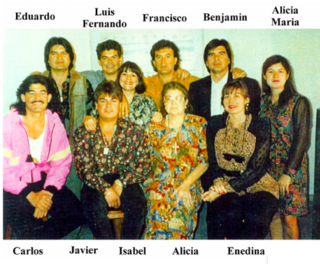
Carlos Alberto Arellano Félix is a Mexican medical doctor who is known for his illegal involvement in money laundering for the Tijuana Cartel. Carlos was born on the 20th of August in the year 1955 in the city of Culiacán, Sinaloa. Historian Paul Eiss states that Culiacán is the origin of modern drug trafficking and the home of Mexico's most powerful drug cartel. Carlos is currently working as a licensed surgeon. He finished his surgical training at the Universidad Autónoma de Guadalajara The Tijuana Cartel is an organisation that is notorious for being one of the most well-known drug trafficking groups in Mexico to smuggle goods into the United States. Carlos’ family is made up of seven brothers and four sisters who inherited the Arellano Felix Organisation from their godfather, Miguel Ángel Félix. Despite Carlos’ involvement in money laundering for the Tijuana Cartel, he is one of two brothers who remains free and is not wanted by the United States law enforcement.
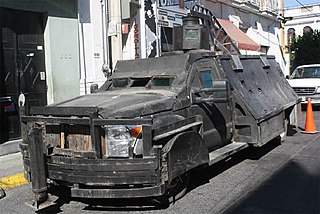
A narco tank, also called rhino trucks or monstruos, is a type of improvised fighting vehicle used by drug cartels. The vehicles are primarily civilian trucks with improvised vehicle armour, which adds operational mobility, tactical offensive, and defensive capabilities when fighting law enforcement or rivals during drug trafficking activities.
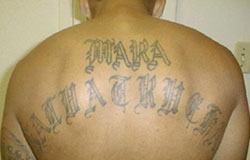
Crime in El Salvador has been historically extremely high due to the presence of various gangs. As of 2011, there were an estimated 25,000 gang members at large in El Salvador; with another 43,500 in prison. The best-known gangs, called maras in colloquial Salvadoran Spanish, are Mara Salvatrucha (MS-13) and their rivals 18th Street; maras are hunted by death squads, including Sombra Negra. Newer rivals include the rising mara, The Rebels 13. El Salvador is one of the three countries of the Northern Triangle of Central America, along with neighboring Guatemala and Honduras, which are all afflicted with high levels of violence.
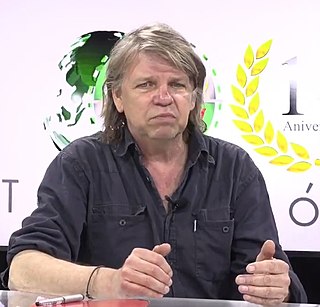
Teun Voeten is a Dutch photojournalist and cultural anthropologist specializing in war and conflicts. In 1996 he published the book Tunnelmensen about homeless people living in an old railroad tunnel in Manhattan. He also wrote books on the war in Sierra Leone and made a photo book on the drug violence in Mexico, on which subject he wrote a PhD thesis at Leiden University.
The Bangladesh drug war or Bangladesh's war on drugs is an ongoing campaign against alleged drug dealers and users by the government of Bangladesh under Prime Minister Sheikh Hasina. The extrajudicial killings of alleged drug dealers by the elite anti-crime unit Rapid Action Battalion (RAB) and the police have been criticized by human rights groups and foreign diplomats.